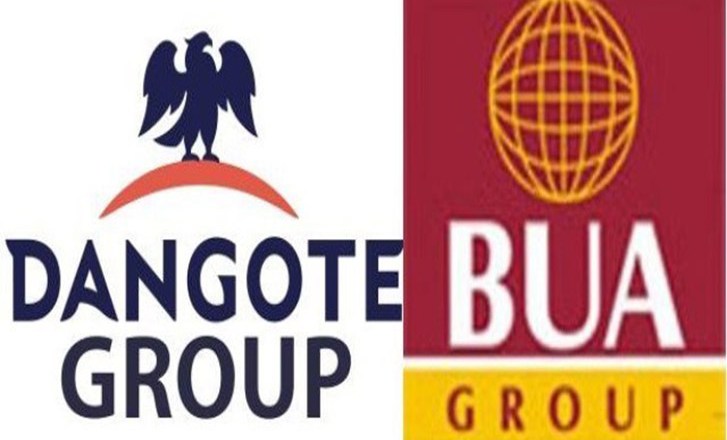By Ralph Tathagata
The duopolistic battle for market dominance between Nigeria’s leading conglomerates, Dangote Industries Limited (DIL) and BUA Group, has continued to take a titanic turn while making bold headlines in the media space.
In a detailed rejoinder to DIL, BUA Group has responded to the recent 7-page editorial published in the national dailies by Dangote. In a meticulously worded statement, BUA accused Dangote of sponsored campaigns of calumny against its organisation, using third-party platforms. Going down memory lane, the major competitor of Dangote, particularly in the cement and sugar sectors of the Nigerian economy, catalogued what it described as “a 30-year history not of rivalry but of resilience; not of enmity, but of endurance”.
Begining with the history of its sugar segment, BUA noted that it entered the market when Nigeria as a nation was faced with a scarcity of sugar, adding that the company was able to supply Nigerian consumers with the best as its stock could.
According to BUA, “it was during this period that Aliko Dangote approached us to purchase sugar. If only we knew he was setting the first of many traps in our business history. He gave us a Societe Generale Bank of Nigeria Cheque, which bounced upon presentation to the bank. Unbeknown to us, this was a ruse that would lead to a court-sanctioned freeze of our assets orchestrated by Dangote.”
What’s more? BUA said that after surviving what it described as “the ashes of deceit”, and started making good progress in various businesses, it wanted to open a sugar refinery and approached one Usman Dantata (now late), Aliko Dangote’s uncle, who leased his NPA waterfront land (4.5 hectares) at the Tincan Island port, ‘Polo House’, to the company.
BUA also alleged that Dangote waited until its contractors and equipment had been mobilised to the site, before going to former President Olusegun Obasanjo, who revoked the license entirely and gave the lease to Dangote, giving BUA 24 hours to vacate the land.
Further narrating how it has survived the “many onslaught of a brutal competition” as a business, especially its Lagos sugar refinery, BUA said it was its Chairman’s late father who handed him the land on which the company’s Lagos Sugar Refinery stands at the moment. “This land was the location of one of his thriving businesses with a warehouse, which he shut down and handed to us without asking for compensation. He just saw the pain of our chairman.”
Also, after surviving what it described as “another Dangote trap, BUA, while claiming to be “the largest sugar refining concern in West Africa”, stated that its businesses have continued to surge forward amid several other attempts, too many to mention.
Delving into details of the battle in the cement segment, BUA stated that it was among the six companies selected and granted licenses under President Yar’Adua’s policy to “break the monopoly” in the sector in 2007. According to BUA, it introduced a floating terminal – ‘BUA CEMENT I’, which was a cement factory built into a large ship, as a stopgap while the company worked on securing a land-based cement plant. After having its application to dock the floating terminal in Lagos met with resistance, BUA said it decided to berth the ship at its own terminal in Port Harcourt, Rivers State.
“Despite this, we faced considerable pushback and it took the decisive intervention of late President Yar Adua, who directed that the Minister of Transport and the Chairman of Nigerian Ports Authority (NPA) honour our right to contribute to the nation’s growth.”
BUA further alleged that Orwell Brown, a former Deputy Comptroller General who was also an older brother to a Dangote Staff, attempted to deport its (BUA) vessel’s entire expatriate crew. “It was a Friday that is forever seared into our memory—the shock of our expatriates rounded up, their confusion as they were shepherded onto a Dangote-funded one-way local flight from Port Harcourt to Lagos en-route Asia via Emirates.
“Upon hearing of what had happened, we reached out to Tanimu Yakubu, the then Chief Economic Adviser, who acted with the urgency that the situation demanded. His call to the CG of Immigration was a lifeline, and our expatriate team was brought back from the Emirates aircraft and not deported. The aftermath was swift action by the President, who ensured that such a misuse of power would not go unchecked. DCG Brown, caught in a tangle of undue influence, admitted what he did to the Minister, and he was later dismissed.”
Summarizing the statement signed by the company’s management, BUA stressed the rejoinder as an over 32 years of being “cast as the antagonists in a narrative woven with malice”, while exonerating itself of any involvement in Dangote’s 7-page editorial.
“To Mr. Dangote and the Dangote Group, we say: Let us build, not belittle. Let us cultivate, not conquer. While we may share the marketplace, we need not share malice. We have nothing to do with your self-inflicted issues. Blame no one but yourself.”
It would be recalled that the protracted battle between the two conglomerates took a fresh turn as each company accused the other of sabotage. The management of DIL while refuting claims by online media that it was engaging in economic sabotage, described the allegation as “spurious and a rehash of a similar report peddled out of malice by a competitor, BUA Group, masquerading as a concerned Nigerian in 2016″.
However, keen industry watchers are curious to see the entrenched bitter, duopolistic rivalry metamorphose into healthy competition for the benefits of other players, consumers, stakeholders and investors alike.






Comment
No comments found.